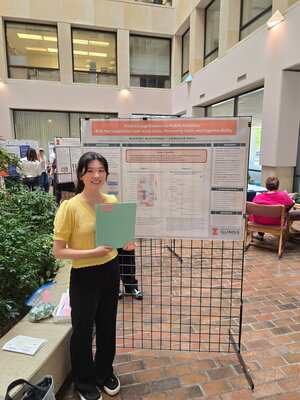
Hello! My name is Bona Kim. I am a second-year master’s student in the Master of Science in Psychological Science (MSPS) program. I work closely with my advisor, Dr. Brent Roberts, exploring how personality develops and shapes people’s lives. I’m grateful for this opportunity to share my story!
This past year in the MSPS program has been truly transformative. While I still have much to learn, I’ve built foundational research skills, strengthened my resolve, and formed a clearer vision of my future. Most importantly, I've learned to drive my own projects—setting timelines, making decisions, and taking full ownership.
My journey began as an undergraduate in South Korea. Back then, I pursued two passions at once: Psychology and an interdisciplinary major called Information Science and Culture (ISC), where I studied Human-Computer Interaction (HCI) and digital content production. I loved the mix of psychology and technology. Combining them opened exciting opportunities to create digital tools addressing psychological challenges with IT-based solutions. I had so much fun developing prototypes like an empathic chatbot using Natural Language Processing (NLP), a gallery app to help with digital hoarding, and an e-book platform for readers with text concentration difficulties. At the time, I expected to go straight into the tech industry and keep building products grounded in psychological insights.
As I gained experience, however, I felt a certain thirst. Business priorities like profitability often conflicted with my values. I wanted my work to make a meaningful impact by helping as many people as possible. I also felt a growing need for deeper expertise, wanting my solutions to rest not just on insights, but on rigorous and credible psychological research.
The turning point became clear when I helped design a financial app in collaboration with Seoul National University’s Happiness Research Center. Using longitudinal data linking the Big Five personality traits, components of well-being, and lifestyle patterns, I was able to suggest personalized consumption strategies. For instance, extroverted people could boost the pleasure side of happiness by increasing relationship spending, while people high in neuroticism benefited from reducing material spending. This experience made one thing clear: I wanted to build solutions based on solid research.
That realization fueled my decision to pursue graduate studies. As my background was mostly in applied work, I knew I needed to build my academic research skills from the ground up. The MSPS program was the perfect steppingstone toward my goal of a Ph.D.
Finding My Place in Research
When I entered the program, I immediately felt that I had finally arrived in the environment I’d long envisioned: surrounded by bright, ambitious peers, inspiring faculty, and abundant chances to learn. Transitioning from the structured life of an undergraduate to managing my own timelines taught me true autonomy. The bigger shift was intellectual. Instead of memorizing textbooks or searching for correct answers, I was now encouraged to think critically, ask original questions, and develop my own perspectives. It was challenging at first, but I’m gradually finding my scientific voice among such talented academics.
Much of this growth has come through my research projects with Dr. Roberts. In my first project, I contributed a chapter to the Handbook of Psychology and Motivation on Social, Emotional, and Behavioral (SEB) skills and the Behavioral, Emotional, and Social Skills Inventory (BESSI)—a line of work led by our BESSI research team. Synthesizing the vast literature on the topic was the perfect way to learn how to build a coherent narrative from countless studies.
Building on that foundation, I’m currently leading a study to translate and validate the BESSI in Korean—the first for the language. Our team's goal goes beyond translation; we’re designing an independent study that will use the Korean BESSI as a research tool. This means I'm working through the full research cycle, from developing research questions and preparing IRB and preregistration documents to coordinating international data collection and interpreting the results. I’m eager to see where this project leads!
On a parallel track, I’m also working with a 20-year longitudinal dataset of UC Berkeley students (1992–2015), collected by Dr. Roberts and Dr. Richard Robins at UC Davis (how cool is that!). We are examining whether personality traits, life goals, and cognitive ability predict major life outcomes two decades later. I conducted multiple regression analyses and presented initial findings at the MSPS Research Fair last spring through a poster, an abstract, and even a science magazine article! I’m now finalizing the analyses and preparing my first manuscript.
Reflecting on these projects, I recognize the most profound change has been my shift from a consumer of science to a producer of it. Before, I stood outside the lab, borrowing findings to create products. Now, I’m at the research table itself, learning to generate the knowledge and evidence that I once only applied. This major transformation has given me more than just new methods. It has equipped me with a critical eye to evaluate research, a sense of responsibility to produce trustworthy findings, and above all, a deeper appreciation for the rigor behind every single study.
This past year was full of ‘firsts.’ My first academic paper, poster session, conference, and, perhaps most meaningfully, the everyday conversations that grow into new ideas. I’m incredibly grateful to have begun this journey here at UIUC, in such a warm and welcoming community. And I’m proud to be in the driver’s seat—staying curious, rigorous, and moving toward my next step: doctoral training and a career as a scientist who innovates for the public good. I can’t wait to see how these projects and my own path continue to evolve!